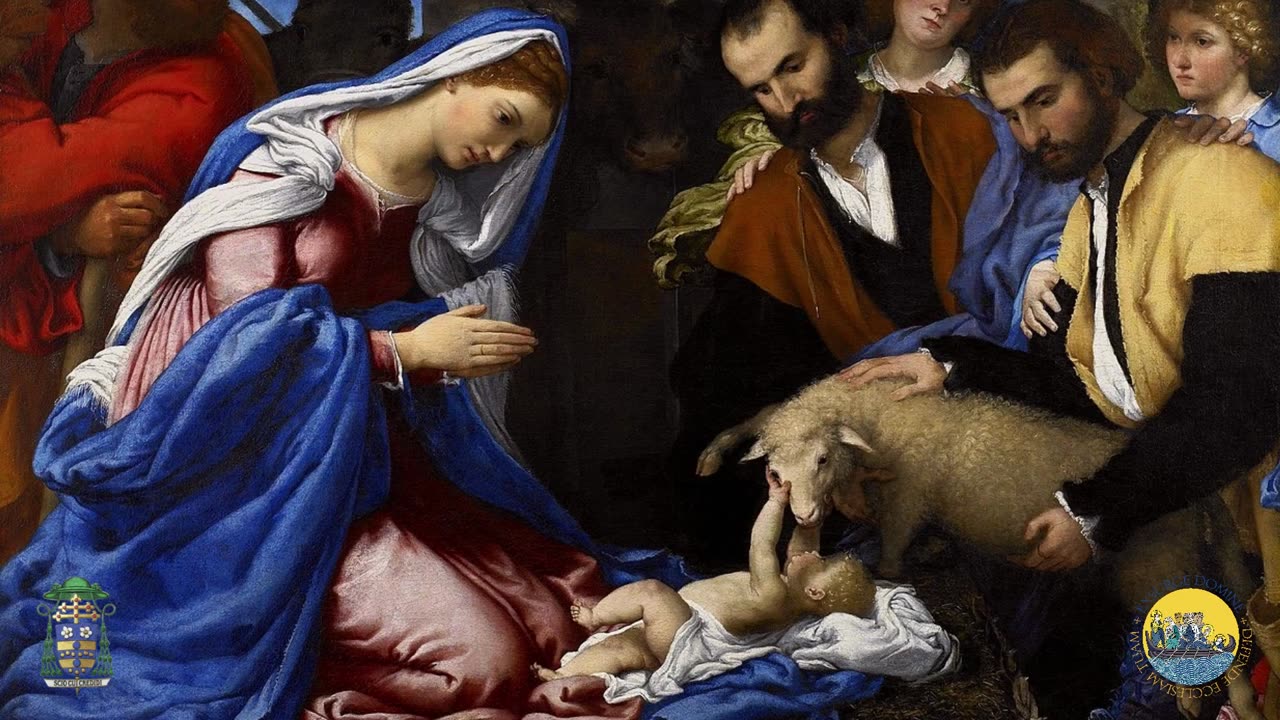Premium Only Content

Arcivescovo Carlo Maria Viganò OMELIA Nella Solennità Del SANTO NATALE 25 Dicembre 2023
Mons. Carlo Maria Viganò
GIACCHÉ TI FECE AMOR POVERO ANCORA
Omelia per il Pontificale nella Natività del Signore
Ad Missam in die
Puer natus est nobis,
et filius datus est nobis:
cujus imperium super humerum ejus
et vocabitur nomen ejus magni consilii Angelus.
Is 9, 6
La solennità odierna costituisce il compimento delle promesse che il Signore ha fatto al Suo popolo; promesse racchiuse nelle antiche Profezie, ad iniziare da quella del Protoevangelo, in cui si menziona la stirpe benedetta della Donna quale vincitrice della stirpe maledetta del Serpente. E io porrò inimicizia fra te e la donna, e fra il tuo lignaggio e il lignaggio di lei; questo ti schiaccerà il capo e tu le insidierai il calcagno (Gen 3, 15). Isaia precisa con solennità: Un bambino è nato per noi, ci è stato dato un figlio. Sulle sue spalle è il potere e il suo nome sarà: Consigliere mirabile, Dio potente, Padre eterno, Principe della pace (Is 9, 6).
Alla Messa in nocte l’Introito ci ha mostrato la generazione del Figlio di Dio dal Padre nell’eternità del tempo: Dominus dixit ad me: filius meus es tu, ego hodie genui te. Quell’eternità contemplata nella notte – il cui silenzio evoca appunto il Mistero di Dio – si cala con l’Incarnazione della Seconda Persona della Santissima Trinità nella Storia del genere umano. Ecco allora la Messa in aurora che squarcia le tenebre del peccato in cui si trova l’umanità: Lux fulgebit hodie super nos, quia natus est nobis Dominus. Una luce è sfolgorata oggi sopra di noi, perché è nato per noi il Signore. Poi, con la Messa in die, ecco mostrarsi l’umanità del Salvatore: Poiché un bambino è nato per noi, ci è stato dato un figlio. Sulle sue spalle è il segno della sovranità e sarà chiamato: Consigliere ammirabile, Dio potente, Padre per sempre, Principe della pace (Is 9, 6). Puer, dice la Scrittura. Ma puer non significa solo bambino, bensì anche servo, perché è nell’obbedienza al Padre che il Figlio accetta di spogliarSi della Sua divinità, formam servi accipiens in similitudinem hominum factus, et habitu inventus ut homo; assumendo la condizione di servo e divenendo simile agli uomini, e apparso in forma umana (Fil 2, 7). Quel nobis, quel per noi, esprime dunque lo scopo dell’Incarnazione e della Passione del Signore, promessa ai nostri Progenitori per riscattare la loro progenie caduta con il peccato e compiutasi con la venuta al mondo, secundum carnem, del Verbo eterno del Padre. Comprendiamo bene per quale motivo la saggezza della Santa Chiesa ci faccia inginocchiare ogni volta che ricordiamo il Mistero ineffabile della Carità divina: et verbum caro factum est, et habitavit in nobis (Gv 1, 14).
Il Verbo si è fatto carne: se pensiamo a queste parole non possiamo non rimanerne abbagliati, contemplando l’infinita bontà di Dio dinanzi alla nostra indegnità e miseria. Ma ancor più abbagliante della luce che rischiara le tenebre della Notte santa – santa perché segna l’ingresso dell’Uomo-Dio nella Storia e nel mondo – è la luce che ha rischiarato la notte del Sabato Santo, quando il corpo di Gesù Cristo martoriato, flagellato, inchiodato alla Croce e infine deposto nel sepolcro è risorto da morte, trionfando sul Nemico del genere umano e compiendo l’antica promessa contenuta nelle Sacre Scritture.
Nel silenzio dell’eternità si compie l’eterna generazione del Figlio dal Padre; nel silenzio si è compiuta l’Incarnazione, dopo il Fiat di Maria Santissima; nel silenzio della capanna di Betlemme nasce il Redentore; nel silenzio del sepolcro Egli risorge. E nel silenzio del Santo Sacrificio della Messa Gesù Cristo, per le parole del sacerdote, scende ogni giorno sull’altare per farSi cibo e bevanda di salvezza.
Qui propter nos homines et propter nostram salutem descendit de cœlis: Egli è disceso dal cielo per noi uomini e per la nostra salvezza. Natus est nobis. Datus est nobis: il Signore non è soltanto nato per noi, ma si è dato a noi, e al posto nostro – come primizia del genere umano – Egli ha voluto morire, in obbedienza ai decreti dell’eterno Padre, per redimerci, riscattarci dalla colpa infinita di cui Adamo ed Eva si erano macchiati, e da tutti i peccati commessi da tutti gli uomini di tutti i tempi. Solo Dio poteva infatti riparare quell’infinita offesa a Dio; solo un Uomo poteva riparare a nome degli uomini: ecco il perché dell’Incarnazione di Dio.
Quando contempliamo Gesù Bambino adagiato in una mangiatoia e avvolto in fasce dobbiamo comprendere che quel Puer – nella duplice accezione di bimbo e di servo – inizia la propria Passione sulla paglia pungente della greppia, nel freddo della notte del 25 Dicembre: a Te che sei del mondo il Creatore, mancano panni e fuoco, o mio Signore! esclama Sant’Alfonso nel canto che tutti conosciamo. Quanto questa povertà più m’innamora: giacché Ti fece Amor povero ancora. Per questo motivo la pietà popolare, istruita dalla solida dottrina, ci mostra l’immagine del Bambinello che dorme adagiato sulla Croce. Per questo nelle raffigurazioni medievali vediamo, vicino alla grotta, ergersi la Croce del Golgota: Perché tanto patir? Per amor mio!
Perché il Presepe ci è così caro? perché la scena della Natività è presente da sempre come simbolo del Natale? Forse perché vi vediamo rappresentata la Sacra Famiglia? o per via della suggestiva cornice dei pastori, dei Magi, del bue e dell’asinello? Quel Presepe – che la devozione ha custodito intatto nel corso dei secoli – ci è tanto caro perché in esso troviamo annunciata la nostra Redenzione per sanguinem ejus (Ef 1, 7), e ci struggiamo nel vedere quel Puer – l’Annunciato dai Profeti, l’Atteso, il Desiderato di tutti i popoli – che viene al mondo per noi, e per morire per noi, e per riparare alla morte eterna che noi ci siamo dati disobbedendo a Dio. Gesù Cristo nasce per morire, e ci stringe il cuore – se solo osiamo pensarci davvero, e non con superficialità – fissare lo sguardo del Bambinello che non ha fatto in tempo a nascere e già soffre nelle Sue carni santissime, e soprattutto si prepara a soffrire i tormenti della Passione di cui noi, creature ingrate, siamo la causa.
Gesù nasce povero. Povero non di una mancanza imposta e non voluta, ma di quella privazione totale che porta Dio stesso, il Verbo di Dio, ad annullarsi – exinanivit, dice San Paolo (Fil 2, 7), a celarsi, a rinunciare alla gloria perfetta del Cielo per farSi carne: il Verbo che Si fa carne. E assume quella carne, quel corpo divino – in virtù dell’unione ipostatica – per soffrire, patire, morire, lasciarSi flagellare, coronare di spine, bastonare, ferire, insultare, coprire di sputi e infine uccidere per noi, per riportarci al nostro destino di beatitudine eterna, che pure avevamo assaporato nel Paradiso terrestre e che abbiamo perduto, cedendo alla tentazione del Serpente. Una tentazione che era palesemente un inganno: eritis sicut dii, sarete come dei. Ma noi eravamo già sicut dii, immortali e perfetti, senza malattie, senza difficoltà nell’apprendere, senza esser soggetti alle passioni. Vivevamo nel Giardino dell’Eden alla presenza di Dio e non avevamo bisogno di nulla, perché a tutto provvedeva la magnificenza del nostro Creatore. Eppure abbiamo preferito credere alle menzogne di Satana e disobbedire a Dio, che ci aveva dato tutto. Ebbene, quel tutto che avevamo ricevuto gratuitamente è stato incomparabilmente superato dal dono di Sé che Dio ha voluto compiere in risposta alla nostra ingratitudine: il dono di Sé nell’Incarnazione e nella Redenzione, sicché alla nostra offesa infinita Egli ci ha sì cacciati dal Paradiso terrestre, ma ci ha anche dato Suo Figlio per riparare ai nostri peccati, con una generosità e una bontà che solo Dio può mostrare. O felix culpa!
Il Presepe ci parla di questo Amore infinito, che Dio compie seguendo una pedagogia divina: Egli ci dona Sé stesso – cosa che non possiamo nemmeno comprendere in tutta la sua ineffabile grandezza – ma chiede sempre la nostra cooperazione; non perché Egli ne abbia bisogno, ma perché vuole che al Suo tutto si associ il nostro nulla, per elevarlo, nobilitarlo e santificarlo. Il Signore ha chiesto il permesso alla Vergine per incarnarSi nel Suo seno e in vista del Suo Fiat l’ha preservata dal peccato. Egli può darci tutto, fino a Sé stesso, a patto che anche noi rispondiamo a questo Amore infinito – amore di Carità perfetta – con l’unica cosa che possiamo restituire con tutto il nostro essere: l’amore soprannaturale. E come il padre regala al figlio i soldini con cui comprargli il regalo di Natale; come il re della parabola dona agli invitati la veste con cui presentarsi alle nozze, così il Signore giunge al punto di donarci la Grazia soprannaturale con cui ricambiare il Suo amore. Quando ascoltiamo le parole della divina Sapienza, Chi si esalta sarà umiliato e chi si umilia sarà esaltato (Lc 14, 11), dobbiamo non solo sentirle rivolte a noi come monito a riconoscere il nostro nulla per essere ricolmati del tutto che il Signore ci dona – quia respexit humilitatem ancillæ suæ (Lc 1, 48) – ma anche come segno profetico dell’Amore divino che si umilia e come punizione ineluttabile dell’orgoglio di Satana: dispersit superbos mente cordis sui, deposuit potentes de sede, divites dimisit inanes.
L’odio verso Cristo – testata d’angolo e pietra d’inciampo su cui si schiantano i Suoi nemici – è motivato proprio dalla incapacità per orgoglio di comprendere il Mistero di Carità che porta Dio a farSi uomo, il Signore a farSi servo; o quantomeno di inchinarsi adoranti dinanzi a questa Carità che è Dio. Deus caritas est (I Jo 4, 8). E, come ammonisce San Giovanni: qui non diligit, non novit Deum, chi non ama non conosce Dio (ibid.). L’incapacità di amare e di lasciarsi amare è, in definitiva, ciò che scava l’abisso tra la Carità infinita di Dio e il nostro miserabile orgoglio, che ci fa rifiutare tanto l’Amore del Signore nei nostri confronti, quanto l’amore che Egli mediante la Grazia ispira verso di Sé nel nostro cuore malato. È la Carità che brucia i nostri peccati, che purifica la nostra anima, che ci innalza alle vette della santità rendendoci veramente simili a Dio; mentre l’amore per noi stessi, per le seduzioni del mondo, per i piaceri della carne ci sprofonda nell’unico abisso dal quale nemmeno l’onnipotenza del Signore ci può strappare, perché fa di noi, del mondo e del diavolo i nostri idoli, i falsi dèi che non possono darci nulla se non la morte.
Dobbiamo comprendere l’inganno infernale che il demonio ci tende ogniqualvolta nel tentarci ci illude di poterci affrancare da Cristo e dalla Sua Legge. Più ci innalziamo credendoci liberi di poter pensare, agire e parlare come vogliamo, più la nostra anima è avvinta dalle catene che le impediscono di salire a Dio; più ci riempiamo di noi stessi, meno spazio lasciamo alla Grazia. Dobbiamo invece ascoltare quel Verbo divino che ci ha dato per primo l’esempio di umiltà e di obbedienza fino a farSi uomo e a morire per noi. Dio che non ha bisogno di nulla Si rende bisognoso di tutto, perché noi che siamo bisognosi di tutto possiamo trovare in Lui ciò che nessuna creatura, nemmeno gli Angeli, osano sperare.
Guardiamo al Presepe, dunque, e in esso contempliamo commossi l’umiltà della Vergine che la Trinità ha voluto divenisse Madre di Dio: ecce enim ex hoc beata me dicent omnes generationes. Guardiamo l’umiltà di San Giuseppe, silenzioso e forte custode della divina Famiglia. Guardiamo all’umiltà degli Angeli, che a differenza degli spiriti ribelli intonano il Gloria su quella povera capanna dove nasce, nell’umiltà, il Messia promesso. Guardiamo all’umiltà dei pastori, ai loro semplici doni, alla loro fede pura, al fatto che la povertà materiale non ha impedito loro di riconoscere l’unico tesoro che meriti di essere custodito gelosamente: quel figlio di Giuseppe, della tribù regale di Davide, che con il Suo vagito di pargoletto irrompe nelle tenebre del mondo per portarvi la luce, per essere vera e sola Luce Egli stesso – come dirà tra pochi giorni Simeone – Lumen ad revelationem gentium, et gloria plebis tuæ, Israël (Lc 2, 32). E così sia.
+ Carlo Maria, Arcivescovo
25 Dicembre 2023
In Nativitate Domini
----------------
FOR LOVE HAS MADE YOU NOW BECOME POOR
Msgr. Carlo Maria Viganò
FOR LOVE HAS MADE YOU NOW BECOME POOR
Homily for the Pontifical Mass of the Nativity of the Lord
Ad Missam in die
Puer natus est nobis,
et filius datus est nobis:
cujus imperium super humerum ejus
et vocabitur nomen ejus magni consilii Angelus.
Is 9:6
Today’s Solemnity is the fulfillment of the promises that the Lord has made to His people; promises contained in the ancient prophecies, beginning with that of the Protoevangelium, in which the blessed seed of the Woman is mentioned as the conqueror of the accursed seed of the Serpent. And I will put enmity between you and the woman, and between your lineage and her lineage, and he will bruise your head, and you will bruise her heel (Gen 3:15). Isaiah solemnly specifies: A child is born to us, a son has been given to us. On his shoulders is power, and his name will be: Wonderful Counsellor, Mighty God, Eternal Father, Prince of Peace (Is 9:6).
At the Mass in Nocte, the Introit showed us the generation of the Son of God from the Father in the eternity of time: Dominus dixit ad me: filius meus es tu, ego hodie genui te. That eternity contemplated in the night – whose silence evokes the Mystery of God – comes down from heaven with the Incarnation of the Second Person of the Most Holy Trinity in the history of the human race. Here then is the Mass at Dawn that pierces the darkness of sin in which humanity finds itself: Lux fulgebit hodie super nos, quia natus est nobis Dominus. A light will shine upon us today because the Lord is born for us. Then, with the Mass in Die, the Saviour’s humanity is shown: Because a child is born to us, a son is given to us. On his shoulders is the sign of sovereignty and he will be called: Wonderful Counsellor, Mighty God, Eternal Father, Prince of Peace (Is 9:6). Puer, says Scripture. But puer does not only mean child, but also servant, because it is in obedience to the Father that the Son agrees to strip Himself of His divinity, formam servi accipiens in similitudinem hominum factus, et habitu inventus ut homo; taking the form of a servant and coming in the likeness of men, he appeared in human form (Phil 2:7). That nobis, that for us, thus expresses the purpose of the Incarnation and Passion of the Lord, promised to our First Parents to redeem their descendants who had fallen through sin, a promise that was fulfilled with the coming into the world, secundum carnem, of the eternal Word of the Father. We understand well why the wisdom of Holy Church makes us kneel every time we remember the ineffable mystery of divine charity: et verbum caro factum est, et habitavit in nobis (Jn 1:14).
The Word became flesh: if we think of these words, we cannot help but be dazzled, contemplating the infinite goodness of God in the face of our unworthiness and misery. But even more dazzling than the light that illuminates the darkness of the Holy Night – holy because it marks the entry of the Man-God into history and into the world – is the light that illuminated the night of Holy Saturday, when the body of Jesus Christ, martyred, scourged, nailed to the Cross and finally laid in the tomb, rose from the dead, triumphing over the Enemy of the human race and fulfilling the ancient promise contained in the Sacred Scriptures.
In the silence of eternity, the eternal generation of the Son from the Father is accomplished; in silence the Incarnation was accomplished, after the Fiat of Mary Most Holy; in the silence of the cave of Bethlehem the Redeemer is born; in the silence of the tomb he rises. And in the silence of the Holy Sacrifice of the Mass, Jesus Christ, according to the words of the priest, descends every day on the altar to make Himself the food and drink of salvation.
Qui propter nos homines et propter nostram salutem descendit de cœlis: He came down from heaven for us men and for our salvation. Natus est nobis. Datus est nobis: the Lord was not only born for us, but He gave Himself to us, and in our place – as the first fruits of the human race – He wanted to die, in obedience to the decrees of the Eternal Father, to redeem us, to redeem us from the infinite sin with which Adam and Eve were stained, and from all the sins committed by all men of all times. In fact, only God could make reparation for that infinite offense against God; only a Man could make reparation in the name of men: this is the reason for the Incarnation of God.
When we contemplate the Child Jesus lying in a manger and wrapped in swaddling clothes, we must understand that that Puer – in the double sense of child and servant – begins his Passion on the prickly straw of the crib, in the cold of the night of December 25th: You, who are the Creator of the world, lack clothes and fire, O my Lord! exclaims St. Alphonsus in the hymn we all know [Tu scendi dalle stelle]. How much more this poverty enchants me: for love has made You now become poor. For this reason, popular piety, instructed by solid doctrine, shows us the image of the Child sleeping lying on the Cross. For this reason, in medieval depictions we see, standing near the cave, the Cross of Golgotha: Why do you suffer so much? For my sake!
Why is the Nativity so dear to us? Why has the Nativity scene always been present as a symbol of Christmas? Is it because we see the Holy Family represented in it? Or because of the evocative setting of the shepherds, the Magi, the ox and the donkey? That Nativity scene – which devotion has kept intact over the centuries – is so dear to us because in it we find our Redemption per sanguinem ejus proclaimed (Eph 1:7), and we yearn to see that Puer – the One Announced by the Prophets, the Awaited, the Desired of all Peoples – who comes into the world for us, and to die for us, and to make reparation for the eternal death that we have brought upon ourselves by disobeying God. Jesus Christ is born to die, and he calls our hearts – if only we dare to think about it truly, and not superficially – to fix our gaze on the Child who has not had time to be born and already suffers in His most holy flesh, and above all prepares to suffer the torments of the Passion of which we, ungrateful creatures, are the cause.
Jesus was born poor. Poor not due to an imposed and unwanted lack, but rather due to that total deprivation that leads God Himself, the Word of God, to annul Himself – exinanivit, says Saint Paul (Phil 2:7), to lower Himself, to renounce the perfect glory of heaven in order to become flesh: the Word who becomes flesh. And He assumes that flesh, that Divine Body – by virtue of the hypostatic union – to suffer, to struggle, to die, to allow Himself to be scourged, crowned with thorns, beaten, wounded, insulted, spat upon and finally killed for us, to bring us back to our destiny of eternal bliss, which we had also tasted in the earthly Paradise and which we lost, yielding to the temptation of the Serpent. A temptation that was clearly a deception: eritis sicut dii – you will be like gods. But we were already sicut dii, immortal and perfect, without disease, without difficulty in learning, without being subject to the passions. We lived in the Garden of Eden in God’s presence and needed nothing, because the magnificence of our Creator provided for everything. Yet we preferred to believe Satan’s lies and disobey God, who had given us everything. Well, all that we had received freely was incomparably surpassed by the gift of Himself that God wanted to make in response to our ingratitude: the gift of Himself in the Incarnation and in the Redemption, so that for our infinite offense He has indeed driven us out of the earthly Paradise, but He has also given us His Son to make reparation for our sins, with a generosity and goodness that only God can show. O felix culpa!
The Nativity scene speaks to us of this infinite Love, which God fulfills by following a divine pedagogy: He gives Himself to us – something that we cannot even comprehend in all its ineffable greatness – but He always asks for our cooperation; not because He needs it, but because He wants our nothingness to be associated with His everything, to elevate, ennoble, and sanctify it. The Lord asked permission from the Virgin to incarnate Himself in Her womb, and in view of Her Fiat He preserved her from sin. He can give us everything, even to the point of giving us Himself, as long as we too respond to this infinite Love – the love of perfect Charity – with the only thing that we can give back with our whole being: supernatural love. And like the father who gives his son the money with which to buy him a Christmas present; just as the king in the parable gives the guests the garment with which to present themselves at the wedding, so the Lord goes so far as to give us the supernatural Grace with which to reciprocate His love. When we listen to the words of Divine Wisdom, “He who exalts himself will be humbled, and he who humbles himself will be exalted” (Lk 14:11), we must hear them addressed to us not only as a warning to recognize our nothingness in order to be filled with the whole that the Lord gives us – quia respexit humilitatem ancillæ suæ (Lk 1:48) – but also as a prophetic sign of Divine Love that humbles itself and as an inescapable punishment for Satan’s pride: dispersit suberbos mente cordis sui, deposuit potentes de sede, divites dimisit inanes.
Hatred of Christ – the cornerstone and stumbling block against which His enemies crash – is motivated precisely by the inability due to pride to understand the Mystery of Charity that leads God to become man, the Lord to become a servant; or at least to bow down in adoration before this Charity which is God. Deus Caritas est (1 Jn 4:8). And, as Saint John admonishes: qui non diligit, non novit Deum, he who does not love does not know God (1 Jn 4:8). The inability to love and to allow ourselves to be loved is, in the end, what carves out the abyss between God’s infinite Charity and our wretched pride, which makes us reject both the Lord’s Love for us and the love that He inspires towards Himself in our sick hearts through Grace. It is Charity that burns away our sins, purifies our souls, and raises us to the heights of holiness, making us truly like God; while love for ourselves, for the seductions of the world, and for the pleasures of the flesh plunges us into the only abyss from which not even the Omnipotence of the Lord can snatch us, because turns us, the world, and the devil into our idols, the false gods who can give us nothing but death.
We must understand the infernal deception that the devil sets for us every time he tempts us into thinking that he can free us from Christ and His Law. The more we rise up believing ourselves to be free to think, act, and speak as we wish, the more our soul is entangled by the chains that prevent it from ascending to God; the more we fill ourselves with ourselves, the less room we leave for Grace. Instead, we must listen to that divine Word who first gave us the example of humility and obedience to the point of becoming man and dying for us. God who needs nothing makes Himself in need of everything, so that we who are in need of everything can find in Him what no creature, not even the Angels, dare to hope for.
Let us look at the Nativity scene, then, and in it let us contemplate with emotion the humility of the Virgin whom the Trinity wanted to become the Mother of God: ecce enim ex hoc beata me dicent omnes generationes. Let us look at the humility of Saint Joseph, the silent and strong guardian of the Divine Family. Let us look at the humility of the Angels, who, unlike the rebellious spirits, sing the Gloria over that poor cave where, in humility, the promised Messiah is born. Let us look at the humility of the shepherds, at their simple gifts, at their pure faith, at the fact that material poverty has not prevented them from recognizing the only treasure that deserves to be jealously guarded: that son of Joseph, of the royal tribe of David, who with the cry of a little child bursts into the darkness of the world to bring light to it, to be the true and only Light Himself – as Simeon will say in a few days – Lumen ad revelationem gentium, et gloria plebis tuæ, Israël (Lk 2:32). And so may it be.
+ Carlo Maria, Archbishop
December 25, 2023
In Nativitate Domini
-
 LIVE
LIVE
Russell Brand
1 hour agoPfizer’s $1,000 Bribe to Push Childhood Vaccines – SF520
4,913 watching -
 LIVE
LIVE
The Charlie Kirk Show
25 minutes agoThe Confirmation Marathon | Davis | 1.15.2025
6,517 watching -
 24:03
24:03
Stephen Gardner
22 hours ago🔥Steve Bannon VOWS TO DESTROY Elon Musk's relationship with Trump!!
9.72K110 -
 59:56
59:56
The Dan Bongino Show
2 hours agoThe Hapless, Goon Democrats Face-Plant At Hegseth’s Hearing (Ep. 2401) - 01/15/2025
183K554 -
 LIVE
LIVE
Steven Crowder
1 day ago🔴 We’re Back: Hegseth’s Confirmation, Cali Wild Fires & Elon's Free Speech Fiasco
34,284 watching -
 1:02:10
1:02:10
The Rubin Report
1 hour agoElizabeth Warren Humiliated as Her Trap for Pete Hegseth Blows Up in Her Face | Rudy Giuliani
4.37K7 -
 LIVE
LIVE
LFA TV
17 hours agoEXTERNAL REVENUE SERVICE! | LIVE FROM AMERICA 1.15.25 11am
5,267 watching -
 LIVE
LIVE
The Shannon Joy Show
3 hours ago🔥🔥LIVE Exclusive With Jeffrey Tucker - Trump Inc. Incoming! Is There Reason For Optimism?🔥🔥
186 watching -
 LIVE
LIVE
Scammer Payback
54 minutes agoCalling Scammers Live
145 watching -
 11:35
11:35
China Uncensored
1 hour agoChina Gloats Over LA Wildfires
1743